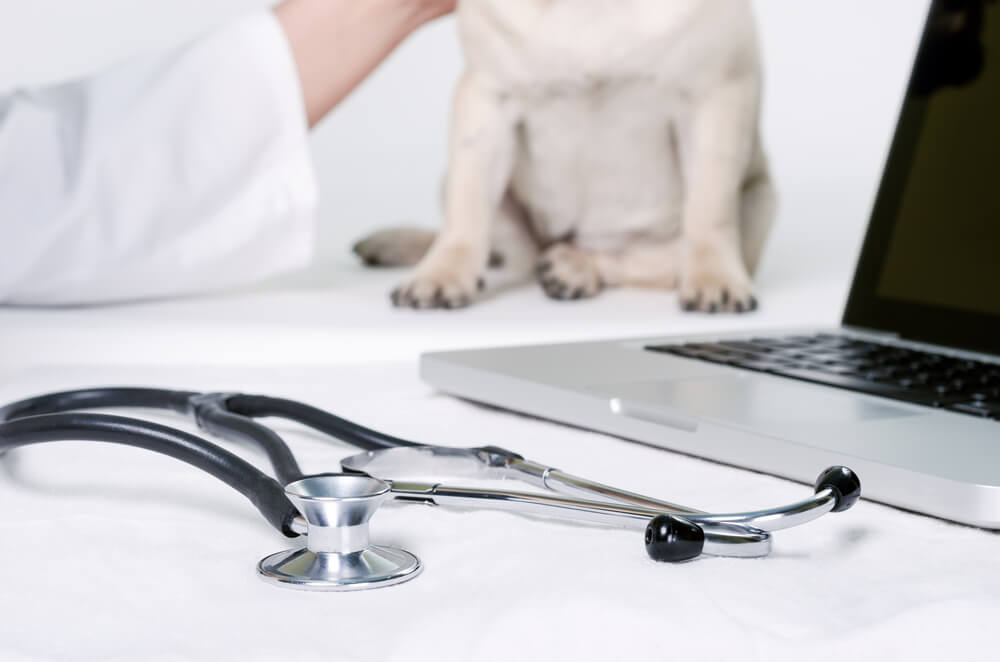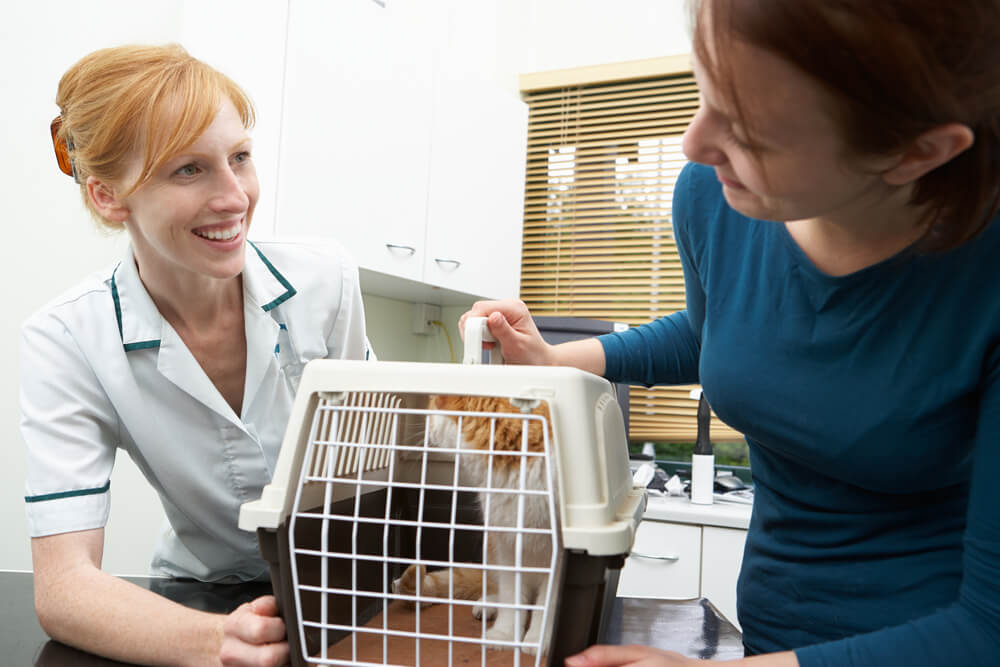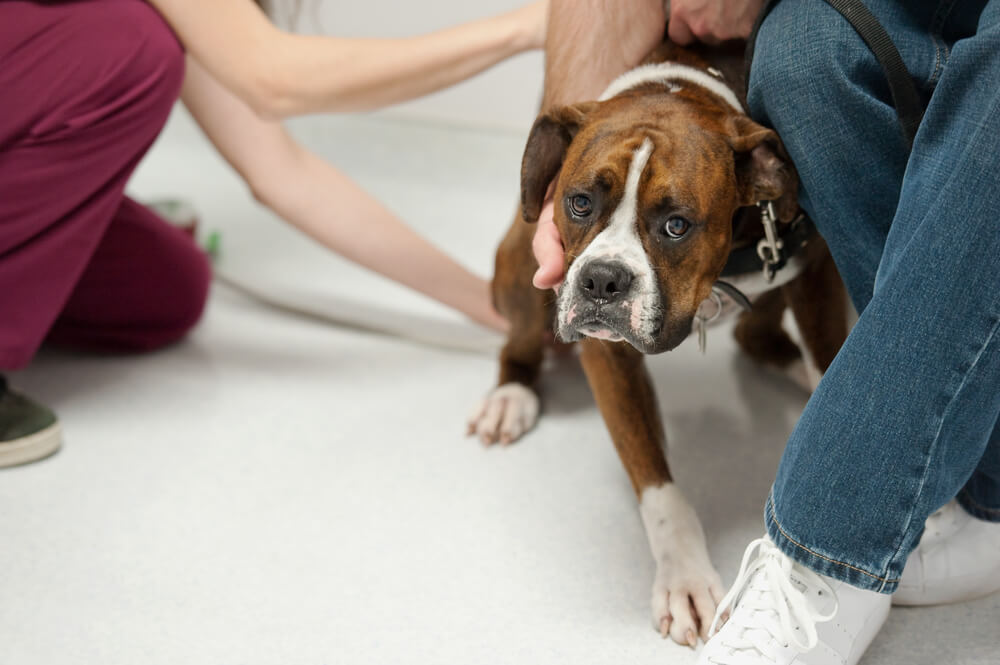
Country Hills Pet Hospital is committed to you and your pet! We understand that your pet holds a valued place in your life and your heart, so naturally you have questions about how to keep them healthy and happy. Trust me when I say we have heard some interesting and outrageous questions/stories to say the least, we have probably even heard it all! There are a few questions, though, that seem to reoccur throughout the day that we’d like to answer! The following list has been composed to not only help you and your pet have a successful and hopefully stress-free trip to the vet, but also to help develop a long-lasting relationship with both the veterinarians & their staff.

1. Can I arrive late or unannounced for an appointment?
It is recommended to please always call for an appointment or at the very least try to let us know you are headed our way with an emergency. Without an appointment, you may be asked to leave your pet as a “drop-off” appointment or wait until the next available time slot if your pet’s condition is not serious. Calling ahead not only helps us rearrange our schedule if necessary, but also to be better prepared with available staff and any medications/supplies your pet may need right away! We also understand when delays happen, but giving us a heads up can help us to let you know whether the doctor is available to see you when you arrive or if there will be a small wait for an available exam room. Let me just say, we don’t like being behind any more than you like waiting!

2. Do I have to bring my pet in with a leash or carrier- they aren’t on one at home and they hate being cooped up?
Our waiting room can be crowded at times and we want to make sure everyone is under control and in the safest condition possible. If you know your pet is aggressive towards others, be sure to let the staff know ahead of time and we can usher you into a room when you arrive! Not to mention, retractable leads are great, but keeping them in the shortest, locked position possible for the duration of your visit is best. We don’t want Fluffy meeting Rocky during checkout or an innocent bystander getting tripped up over unattended leashes! Oh No- forgot your leash? No problem- we have plenty of colorful leashes hanging up in the lobby for yours to keep before, during, and after your pet’s appointment!

3. My pet may bite- I probably should let someone know about it.
Yes Please! Our trained technicians can read most animal’s body language; however, you know your pets even better! Our staff also knows that pets act differently at the vet’s office (my own cat included!). If you think or know that your pet may try to bite or scratch, don’t be afraid to let us know. A pet can act out of character in the vet clinic for a number of reasons- pain, fear, different smells, or the need to protect their human can all provoke aggression. Fortunately, there are ways to work effectively with a fear aggressive pet. Muzzles, sedation, and sometimes even separating them from their owners can safely subdue aggressive tendencies. If an exam needs to be performed in the treatment area away from you, this does not by any means point to you or your pet for being bad, we just have everyone’s best interest for safety in mind and would hate to see anyone get injured!
4. Do I really need to tell the vet the little details?
In order to understand why your dog is feeling poorly or to know which medications can be safely used to treat your pet, the doctor needs to know pertinent information. If your dog has you trained to feed him/her table food, then they aren’t just eating dog food. If you’ve been sharing your own medications, they fell out of the car because they weren’t properly restrained, or they ate a batch of your “special” brownies- it needs to be said. It may be something embarrassing or awkward like eating out of the bathroom garbage or maybe your favorite pair of underwear is missing, but let’s be honest, we’ve seen it and heard it all before! We can tell when the facts don’t add up-your pet’s incision couldn’t possibly have opened up with your pet properly wearing their cone of shame. Giving all the facts could not only save you money on unnecessary tests/medications, but it could save your pet’s life!
If your pet accidently gets into medications, poisons, or food they shouldn’t; always remember to gather all the facts. When, how much, product names/ packaging, and strength/dose are needed to accurately diagnose & treat your pet!
5. Can I have someone else bring in my pet?
This is your chance to communicate with your veterinarian and be your pet’s advocate. Again, the veterinarian needs to know as much information about your pet’s illness, symptoms, and progression as possible, and without these things, the right diagnosis may be missed (see #4).If your child, mother, brother, etc can’t make important financial decisions for the proper medications or testing, your pet may not get the treatment they need. When your pet is sick it helps to have the decision-makers present at the visit, details like how to administer medications properly or what to do if symptoms continue can easily get lost in translation, even when traveling from spouse to spouse!
6. My cell phone is ringing, should I take this call now?
Our staff is giving you their undivided attention during your appointment time and need to be able to communicate with you. We are all human and know emergency calls need to be taken, let us know what’s going on and if another decision-making adult is with you, feel free to step out of the room- we will be sure to catch you up when you return!
7. My pet is having issues with urination- what should I do?
The first step to diagnosing a urinary tract issue is testing a sample. If your pet has been having accidents in the house and think a sample may be needed for testing try to collect one at home or at least try not to let them water the bushes out front before your appointment! Collecting a sample at home may not sound fun for you, but it really is easier on your pet (and us too for that matter). This way, they won’t have to leave the room to collect a urine sample only to be distracted by all the wonderful smells of pets previously before them! Of course there are times where they just won’t cooperate at home and give you what you need. No problem- just try to keep them from relieving themselves on the way!
8. My pet is really attached to me, can I hold him/her for you?
Doing an exam or taking a temperature on a cat or dog can prove to be a difficult task sometimes. Our staff is properly trained on how to restrain your pets safely so no one gets injured. While you may think that Princess would do better in your arms, you are the last person we want to see get bit or scratched. The veterinarians have a routine in the way they examine your pet and won’t be able to get a proper look if your hand, leg, chest, or other awkward body part is in the way. The staff also needs the proper space to be able to move around the exam table and shift your pet accordingly. It may seem like petting & snuggling them is reassuring, but in some cases, it just excites your pet even more. Just having you in their vision and hearing you talk to them can be enough to keep your pet calm.
9. I have bite wounds from my pet- should I show the vet?
While we definitely care about our client’s well being and health; our veterinarians are animal doctors, not people doctors. There are some diseases that can be passed back and forth between humans and animals and we will take the time to warn you about those and in some instances may even advise you to see your own doctor. However, human medical questions should be saved for your own doctor. Showing off bite wounds, bruises, or bug marks in inappropriate areas is not something we really want to see- a verbal explanation is just fine and less embarrassing for everyone in the room.
10. I am on antibiotics myself- can I just give these to my pet?
While there are tons of medications for people, it is not recommended to give most of these to your pets. Human medications are not always processed the same way in cats & dogs and can cause more harm than good. Even giving just one Tylenol can cause serious harm to your cat. Sometimes veterinary drugs have a generic version that is made for humans and carried at your local pharmacy for less cost; however, certain ingredients contained may not be appropriate for your pets. Also, failing to mention any medications or supplements that your pet is getting can cause serious drug interactions and may prevent your pet from getting the right medication they need now.
So the next time you need to bring your pet in to see our staff; keep these answers in mind to help make your trip a happy one for all involved and don’t forget to ask lots of questions! We love hearing them and can’t wait to educate you with answers!
